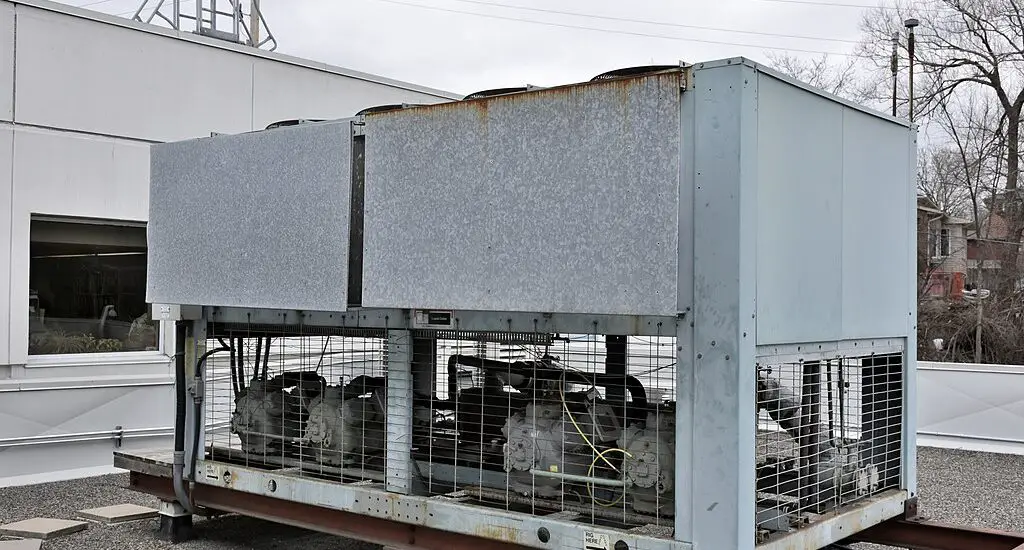Water cooled condenser vs air cooled condenser—it’s the hot topic in the cooling game. If you’ve been searching high and low for an answer, the wait is over! Let’s dissect these cooling counterparts to find out which is better

Table of Contents
Types of Condensers
There’s more than one way to cool a room—or anything, for that matter. And that’s where the different types of condensers come into play, especially our two contenders: water cooled and air cooled condensers.
Water Cooled Condensers
Water cooled condensers are a fascinating part of the cooling systems that we encounter every day. As the name suggests, these condensers utilize water as a cooling medium.
They function based on the principle of heat transfer where the system’s refrigerant absorbs the system’s excess heat and then transfers it to the circulating water. The water, with its superior heat absorption capacity, becomes the carrier of this heat, moving it away from the system and consequently cooling it down.
These condensers are typically found in large, industrial settings or in places where there’s an abundant supply of water and high cooling demands. The main reason is that they are highly efficient in dealing with large amounts of heat. This makes them the go-to option in high-heat environments where air cooled condensers may not perform optimally.
Advantages of Water Cooled Condensers
Alright, so what’s so great about water cooled condensers?
High Efficiency
Water cooled condensers can be like the Usain Bolt of the cooling world—fast and powerful. They can dissipate a whole lot of heat faster than their air-cooled counterparts. It’s all thanks to the superior cooling properties of water.
Longer Lifespan
These condensers don’t burn out quickly. They’ve got the stamina to go the distance, lasting longer than air cooled condensers on average. You might say they’re the tortoise in the race, slow but steady.
Disadvantages of Water Cooled Condensers
But they’re not all rainbows and butterflies. They’ve got their downsides too.
Water Usage
They require water—a lot of it—to operate. If you’re in a water-scarce region, it can be a huge challenge to keep them running.
Initial Cost and Maintenance
Also, their initial cost and maintenance can make your wallet wince. More moving parts mean more maintenance and that can pile up the dollars.
Air Cooled Condensers
On the other side of the aisle, we have air cooled condensers. These condensers use air as their cooling medium.
The process involves the condenser coil releasing heat to the surrounding air, which is then pushed away by a fan, allowing the system to get rid of the heat and cool down.
One might consider these condensers as more environmentally friendly as they don’t require water to function, which is a significant advantage in regions where water is scarce. Moreover, they are usually easier to install and maintain, making them a popular choice for smaller systems or situations where water usage might be impractical or too expensive.
Advantages of Air Cooled Condensers
So, what’s in their favor?
Low Maintenance
They’re like that low-maintenance friend. They don’t demand much—just a good airflow and they’re good to go.
Lower Water Consumption
These condensers don’t need a gallon of water to function. They’re perfect for regions where water is as precious as gold.
Disadvantages of Air Cooled Condensers
But, remember, every rose has its thorns.
Limited Cooling Capacity
These condensers can struggle to keep up when the heat is turned up. They don’t have the same cooling capacity as water cooled condensers.
Efficiency Drop in High Ambient Temperatures
Also, their efficiency can take a nosedive when the surrounding temperature rises. Imagine trying to keep a cold drink cool in the middle of a desert—pretty tough, right?
Check out these other related articles…
Condenser Fan and Compressor Not Running: 8 Proven Solutions
Types of Condensers: Your Comprehensive 411 Guide
Refrigerator Condenser Problems: 3 Proven Solutions
Evaporative Condenser: A Detailed Guide
Evaporative Condenser vs Cooling Tower: Comprehensive Guide
Air Cooled Condenser Refrigeration: Your Ultimate 411 Guide
Water Cooled Condenser Refrigeration: Your Comprehensive 411
Water Cooled Condenser vs Air Cooled Condenser: Comparative Analysis
So how do these two types of condensers stack up when compared side-by-side? As we’ve noted, each has its distinct advantages and drawbacks. When it comes to efficiency, water cooled condensers often take the lead. Thanks to the superior cooling properties of water, these condensers can handle more heat and deliver better cooling results. This makes them perfect for larger, more demanding cooling tasks.
Air cooled condensers, however, shine in their simplicity and sustainability. They’re easier to install, require less maintenance, and save precious water resources. They might not be as powerful as their water cooled counterparts, but they are more than capable for moderate cooling tasks. In locations where water is a precious resource, these condensers can be a smart choice.
Making the Right Choice
When it comes down to choosing between a water cooled and an air cooled condenser, the decision should primarily be based on your specific needs and circumstances. Consider factors such as your available resources, environmental conditions, the cooling demands of your system, and maintenance capabilities.
If you’re in a location with plenty of water resources and you have high cooling requirements, a water cooled condenser might be the best bet. However, if you’re looking for an easier, more sustainable option and you’re dealing with moderate cooling tasks, an air cooled condenser could be the way to go.
Remember, the “best” choice is often subjective and highly dependent on individual circumstances. Take your time, evaluate your situation, and make an informed decision. Because at the end of the day, what matters most is that your cooling system works effectively and efficiently for your specific needs.